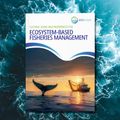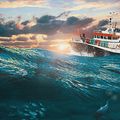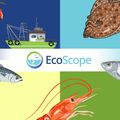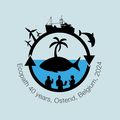EcoScope and partners celebrate 40 years of Ecopath innovation in ecosystem modelling with Ostend conference
The EU-funded EcoScope project joined forces with the European Marine Board and the Flanders Marine Institute (VLIZ), as well as the Ecopath International Initiative, the US National Oceanic and Atmospheric Administration (NOAA) and the University of Southern Mississippi to organize a 6-day conference, titled “Ecopath 40 Years – The Ecosystem Continuum: From knowledge to decision”, in Ostend, Belgium on June 3-8, 2024.
Over the past four decades, Ecopath with Ecosim (EwE) marine ecosystem modelling software has been steadily gaining in importance as a tool for marine management and policy making, organisers noted.
This conference supported the aim of the EcoScope project, which focuses on promoting sustainable, ecosystem-based fisheries management, they added. EcoScope is developing and implementing EwE models to assess and manage the impacts of fishing and environmental changes across European seas. The European Marine Board, one of the co-organisers of the conference, leads the work package on stakeholder engagement in the initiative.
The first part of the conference featured dozens of presentations and speakers fleshing out various aspects of Ecopath applications in sessions focused on Skill assessment calibration, validation and uncertainty in models; Novel uses of EwE; Spatial modelling with Ecospace; Climate change, ecological, economic and social aspects, and ensemble modelling; and Making ecosystem-based management (EBM) operational and policy relevant.
Keynote speeches were given by Howard Townsend of the NOAA, on progress towards operational ecosystem-based fisheries management in the US, and by Carl Walters
Among the workshops and courses constituting the second part of the conference, EcoScope of the University of British Columbia Institute for the Oceans and Fisheries.
Researchers noted that the “Science-Policy workshop: Upscaling marine ecosystem models to implement EU plans and directives”, held on June 6, was of particular relevance to EcoScope. In this workshop, examples of EwE models from various EU-funded projects were used to highlight how the software helps policy makers, including work done by the EC Joint Research Committee (JRC) to prepare models for to improve the Marine Strategy Framework Directive (MSFD); efforts to keep human activities compatible with both the MSFD and the Common Fisheries Policy (CFP); addressing climate change (together with nature restoration and biodiversity) with spatial modelling; and use of EwE models to enhance the Digital Twin of the Ocean through end-to-end modelling. Participants in the workshop also discussed potential unaddressed needs of policymakers and how models can be linked to the European Digital Twin Ocean (EDITO).
Other workshops and courses included “Data lakes for ecosystem modelling” on combining European Marine Observation and Data Network (EMODnet) and CMEMS data into the Data Lake for the EDITO; Socio-economics in EwE; Historic / archaeological EwE; a bootcamp coordinated by Villy Christensen of the University of British Columbia (UBC) in which participants brought their own models for feedback and suggested improvements; Using CMEMS spatial data; EwE from scripts; the EwE Spatial-temporal framework; and EcoTracer, in which participants learned and practiced tracking persistent pollutants through the food web hands-on.





